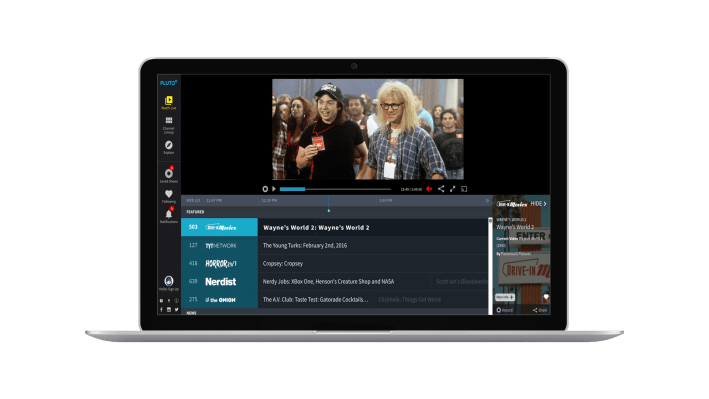Pluto TV, a video streaming service targeting cord cutters by offering a TV-guide like experience that connects you to hundreds of online channels, has raised $30 million in Series B funding, valuing the business at $140 million. The new funding comes from ProSieben of Germany, one of Europe’s largest independent media companies, and lifestyle media company Scripps Networks Interactive. The additional capital will help to fuel Pluto TV’s expansion into the European market, the company says.
ProSieben led the oversubscribed round, which also included participation from new investors Scripps Network Interactive and Sallfort PrivatBank. Existing investors USVP, Sky, Luminari Capital, Chicago Ventures and Thirdwave Capital Partners joined, as well.
The company, which last year nabbed Spotify’s chief content officer Ken Parks for its executive chairman, raised $13 million in Series A funding in late 2014.
Unlike other online streaming services, which also cater to those who still subscribe traditional television, Pluto TV from the start has more narrowly focused on acquiring consumers who are abandoning their cable and satellite TV subscriptions. However, instead of offering on-demand TV and movies like Netflix, Pluto TV attempts to replicate the TV experience through online streams that you can “tune into” much like TV broadcasting.

In the U.S., the company has over 75 content partnerships with TV networks, studios, publishers and digital media companies, including Sky, NBC, A&E, CBSi, Bloomberg, Paramount and others.
It’s also adding content via newcomers to the streaming video market, whose niche offerings may have otherwise struggled to find traction. This is the case with the recent launch of the celeb and pop culture-focused PEN, for example – aka the People Entertainment Network, a joint project from People and Entertainment Weekly.
This area, perhaps, is where Pluto TV has the most potential. Explains Pluto TV co-founder and CEO, Tom Ryan, it will be difficult for consumers to discover all the niche services, especially given “how chaotic and crowded the space has become and how high the cost of user acquisition is,” he says.

“Pluto TV has already aggregated over 5 million [monthly active users] in one place and a lot of these niche services are already looking to us to help them get their content discovered and drive users to their platforms,” Ryan adds. “We believe most consumers don’t want to go in and out of different apps for their entertainment.”
To some extent, this is Amazon’s strategy as well, but with paid networks. The company now allows users to add on subscriptions to channels like Showtime and Starz through Amazon Video. The difference is that Pluto TV is focused on free video, not premium channels.
Pluto TV attributes its user growth – up from 500,000 in the first quarter of 2015 – to the accelerating cord-cutting trend, as well as to distribution partnerships with Vizio Cast and the new Xiaomi Mi Box, where it comes pre-installed.
It also has apps for streaming media devices, like Roku, Apple TV, Amazon Fire TV, and more recently, PlayStation 3 and 4.
The company also acquired Berlin-based TV startup Quazer in order to immediately arrive in Germany, while also giving it footing in Europe as it prepares to expand. Including the acquisition, Pluto TV now has a team of 50 and plans to hire a VP Sales to begin building out its direct sales team in the months ahead.
Currently, the startup generates revenue through advertising, which comes through its content and device partners selling into the platform, as well as programmatic. Ryan declined to discuss the revenue situation in detail, however.
“We can’t discuss the details of our financials but I can tell you that, having only started monetization less than a year ago, we and our content partners are delighted with the progress,” he says.
According to Ryan, the company plans to use the new funds to further invest in product, content and marketing, while also moving toward the goal of becoming a global destination for free television.
“With this funding and the expansion into Europe, Pluto TV is uniquely positioned to become the global OTT destination for free television. That’s the goal. That’s the future of TV,” he says.
